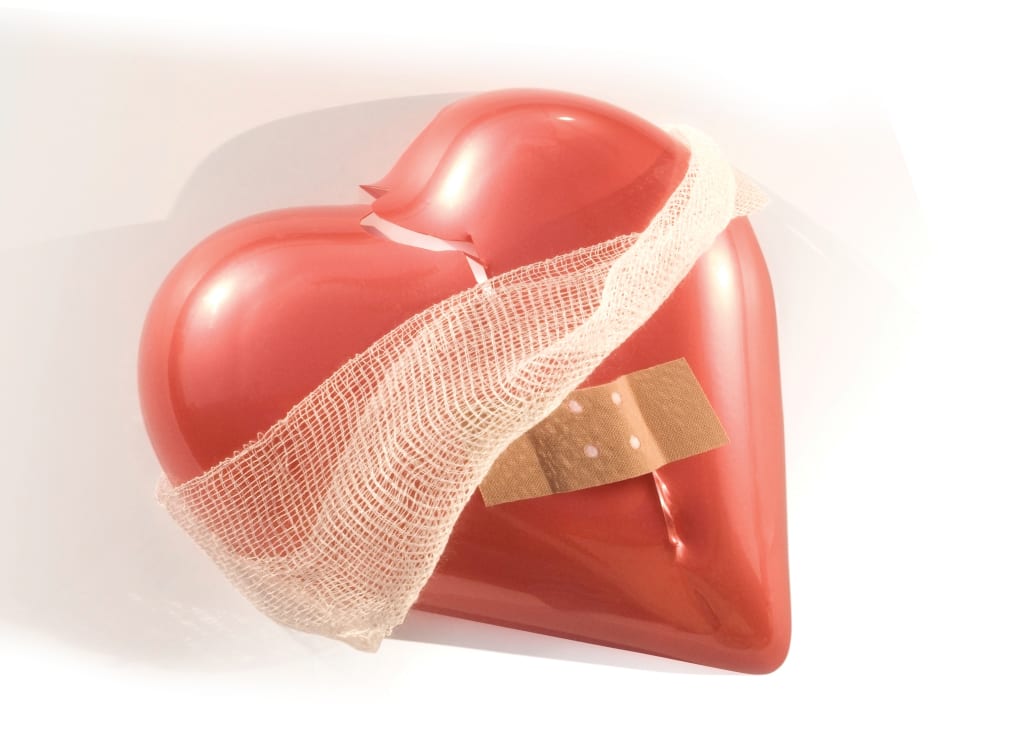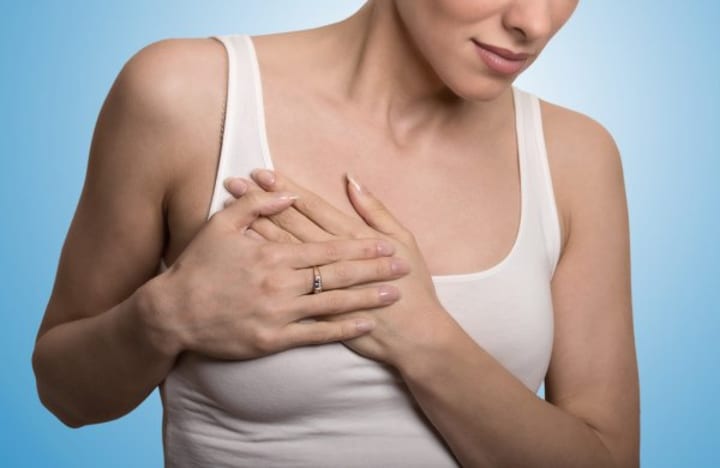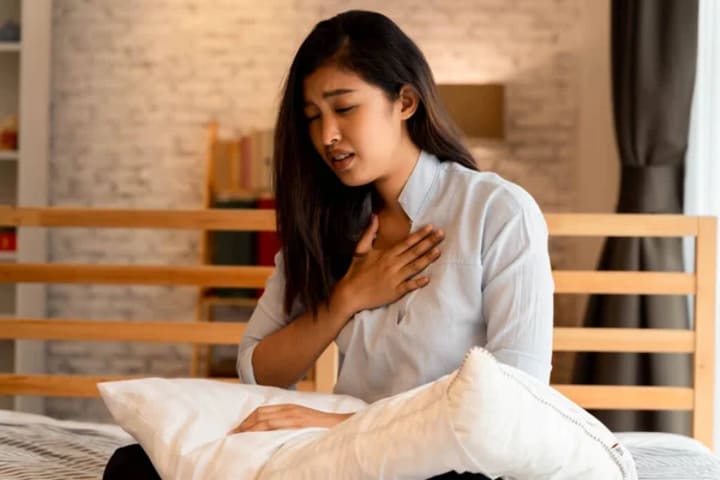A Foolproof Guide to Symptoms of Heart Attack in Women Over 40s
A heart attack can happen to anyone, at any age, so it’s important to know the warning signs of a heart attack in women over 40s.

The symptoms of a heart attack in women over 40s are often very different from those experienced by men, and also different from younger women. While anyone who experiences the symptoms of a heart attack should seek medical attention immediately, it’s important to know what to look out for so you can get help fast if needed. In this guide, you’ll learn the most common signs of heart attack in women over 40s, as well as how to differentiate them from the more mild variety of anxiety and panic attacks that occur in this age group as well. Let’s get started!
Left chest discomfort

One symptom of heart attack women should be aware of is chest discomfort, which may feel like a tight or squeezing sensation. This can happen when your heart muscle isn’t getting enough oxygen-rich blood and begins to die. Chest discomfort can also occur if you are on top of a high place and it feels like someone is pushing down on your chest or stomach. The pain may also extend into one or both arms, either as a sharp pain that feels like pressure or as an ache that slowly worsens over time. In rare cases, cardiac events are triggered by anxiety and stress; rapid breathing will often accompany such symptoms, especially if you have panic disorder with agoraphobia.
How to tell if shortness of breath is from anxiety

The most common anxiety symptom for women is shortness of breath, and I can tell you from personal experience how scary it can be. But there are actually a few different reasons why your chest might feel tight or your breathing might feel labored. Here’s how to tell if shortness of breath is an anxiety attack or something more serious. First, though, it’s important to remember that even if it IS an anxiety attack, you should still seek medical attention as soon as possible because anxiety attacks often lead to heart attacks and other dangerous health issues. It is always preferable to be safe rather than sorry! (For more on what a heart attack looks like, click here.)
Pain spreading to arm, neck, or jaw
Because more women have heart attacks than men, they may be less likely to realize that they're having one. The symptoms are also different. Unlike a man's heart attack, which can cause crushing chest pain and intense nausea, many women experience non-cardiac chest pain that doesn't radiate anywhere else. This is often because of abnormal heart valve function (which most commonly affects older women) or other underlying heart conditions like coronary artery disease or angina. Symptoms may include stabbing or burning arm pain and/or neck or jaw discomfort that radiates into your shoulders and upper back. Fatigue and shortness of breath may accompany these symptoms as well. If you experience some or all of these symptoms—especially if accompanied by nausea—seek medical attention immediately.
Why am I sweating so much

The most common symptom of a heart attack in women is feeling very warm, with sweating. If you feel like you’re going to faint or collapse, call for help immediately and then lie down with your feet elevated above your head. If you have any chest pain or discomfort, place one hand on your chest and one on your lower stomach. Take deep breaths and keep checking for signs that it’s a heart attack until emergency personnel arrives. While some people experience numbness or tingling around their mouth, hands, or feet during a heart attack, most people will have severe pain (usually described as crushing) in their chest wall that radiates into their neck, jaw, or arms. Back pain might also be a problem.
Anxiety or panic attack symptoms
Chest pain or discomfort (including heavy feeling, tightness, pressure) may be mild or severe. Discomfort can radiate up from under your breastbone (sternum) and feel like uncomfortable pressure. You may feel like you're having a heart attack if you have chest pain with other symptoms such as shortness of breath, dizziness, lightheadedness, or nausea. The pain can be sharp or dull and sometimes lasts longer than 10 minutes; it also can come and go for hours without warning. If you think you're having a heart attack and don't get any relief after 30 minutes of resting, call 911 immediately and use an automated external defibrillator if one is available.
What is a cold sweat
Excessive sweating is one of those signs, especially a cold sweat that isn’t accompanied by fever or other signs. Cool sweats may feel good at first because they help you cool down, but if you’re not actually feeling hot and your heart rate doesn’t increase when you start sweating, it could be a sign that something is wrong. It doesn’t mean there’s definitely a heart attack, but it should trigger some concern—especially if coupled with other symptoms like shortness of breath or pain in your left arm. Those are classic warning signs for heart attack. Although women often have different symptoms than men do, they can still experience a wide range of symptoms; shortness of breath, nausea, and dizziness are among them.
How to cure hangover nausea and vomiting
Try having a bit of food and drink lots of water. Alcohol dehydrates your body, which causes hangover nausea. On top of that, carbonated drinks can upset your stomach and even lead to heartburn (which is never fun). Start by eating crackers or toast, then drink plenty more water or a sports drink like Gatorade. You may want to chug down some ginger ale as well—not only does it have less alcohol than beer or wine, but it can help settle your stomach and give you some energy while you’re waiting for those pesky bubbles to subside. And speaking of heartburn: Try not to eat greasy foods before bed, which can cause discomfort during sleep—and nobody wants that!
How to get rid of fatigue and weakness
Fatigue and weakness are common symptoms of a heart attack, particularly for women. Fatigue alone is often dismissed as a simple case of being overworked but it could be an early symptom that you're experiencing a heart attack. Other symptoms include nausea, breathing difficulty, pressure around your chest or arms, and pain in your left arm that may travel to your neck, shoulders, or jaw. The best way to tell if these are really signs of heart attack is by seeking medical attention immediately - don't take chances on these dangerous symptoms!
To wrap it up!
It’s impossible to cover all your risk factors for heart disease, but below are some things you can do: Don’t smoke. Avoid excessive alcohol consumption. Limit salt intake and get regular physical activity by walking and eating nutritious foods. Stay engaged socially—getting out with friends is a great way to unwind and improve your quality of life. If you have any questions or concerns about these symptoms, consult your primary care physician right away.
About the Creator
Anirban Bose
Hello,
My name is Anirban, and I'm from India. I'm an E-Book and article writer with plenty of expertise. Article writing, E-Book writing, report writing, academic writing, blogposts, and social media posts are among my specialties.






Comments
There are no comments for this story
Be the first to respond and start the conversation.